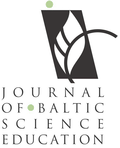RESEARCH-ORIENTED COLLABORATIVE INQUIRY LEARNING MODEL: IMPROVING STUDENTS’ SCIENTIFIC ATTITUDES IN GENERAL CHEMISTRY
| Title | RESEARCH-ORIENTED COLLABORATIVE INQUIRY LEARNING MODEL: IMPROVING STUDENTS’ SCIENTIFIC ATTITUDES IN GENERAL CHEMISTRY |
| Publication Type | Journal Article |
| Year of Publication | 2020 |
| Authors | Rohaeti, E, Prodjosantoso, AK, Irwanto, |
| Journal | Journal of Baltic Science Education |
| Volume | 19 |
| Issue | 1 |
| Start Page | 108-120 |
| Pagination | Continuous |
| Date Published | February/2020 |
| Type of Article | Original article |
| ISSN | 1648-3898 |
| Other Numbers | E-ISSN 2538-7138 |
| Keywords | collaborative inquiry learning, general chemistry, pre-service chemistry teachers, research-oriented learning, scientific attitudes |
| Abstract | Promoting students’ attitudes, a part of affective domains is a major goal in higher education. Unfortunately, only a few studies were available related to the improvement of pre-service chemistry teachers’ attitudes as this domain was rarely explored using a mixed teaching approach. In this quasi-experimental research, we investigated the effect of the Research-Oriented Collaborative Inquiry Learning (REORCILEA) in improving students’ scientific attitudes. A total of sixty-four (6 males, 58 females) first-year pre-service chemistry teachers at the Department of Chemistry Education of a public university in Indonesia attended the General Chemistry course. In order to collect the data, the Scientific Attitudes Scale and Interview Protocol were administered. The data were then analyzed using t-test and thematic analysis. The results of the t-test revealed that students in the experimental group obtained significantly greater scores than the ones of the control group regarding their scientific attitudes. After analyzing the interview data qualitatively, students who were exposed to non-traditional teaching approach had stronger learning interests and enjoyed the chemistry lectures. In conclusion, REORCILEA model could be considered more effective in improving students’ scientific attitudes compared to conventional teaching methods. |
| URL | http://oaji.net/articles/2020/987-1581269848.pdf |
| DOI | 10.33225/jbse/20.19.108 |
| Refereed Designation | Refereed |
| Full Text |
